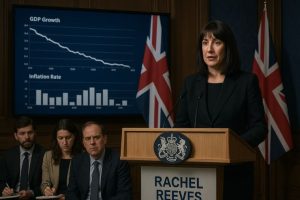In 2025, few topics have stirred as much debate in the UK financial and political arena as Rachel Reeves’ proposed reforms to the non-dom inheritance tax regime.
As someone who’s watched the economic and tax policy landscape closely, it’s hard not to notice the growing tension between fairness and financial flight. The Chancellor’s considerations are not just abstract political calculations, they’re deeply tied to how the UK positions itself on the global economic stage.
Wealthy individuals, global investors, and financial professionals are all watching with interest, and in some cases, with concern. In this article, we explore the evolving narrative, the potential U-turn in Reeves’ approach, and what this means for the UK’s future as a global financial hub.
Why Is Rachel Reeves Rethinking the Non-dom Inheritance Tax Policy?

Rachel Reeves, as the new Chancellor under Labour’s 2025 government, initially set out to overhaul the UK’s tax system by targeting the long-criticised non-dom regime. The idea was straightforward, bring more fairness to the system by ensuring that wealthy non-domiciled individuals contribute their fair share.
However, what seemed like a populist and financially responsible policy on paper has turned out to be more controversial in practice. Financial institutions, wealth managers, and even fellow politicians began expressing concerns over the possible unintended consequences.
Reeves’ proposed changes to the inheritance tax for non-doms have sparked fears of driving away the very group that fuels investment in London’s property market, arts, business, and banking sectors.
Critics argue that a sharp departure from the old tax structure without a phased approach could destabilise sectors already recovering from Brexit and economic downturns.
While Reeves remains committed to a fairer tax policy, the mounting pushback is forcing her to re-evaluate. It’s not a question of whether change is needed, but how fast and how far it should go.
What Are Non-dom Tax Rules and Why Are They Controversial?
The concept of non-domiciled status in the UK has long been a contentious one. A non-dom is someone who resides in the UK but claims their permanent home is abroad. This status allows them to avoid paying UK tax on foreign income and gains, provided they do not bring the money into the UK.
The Roots of Controversy
Non-dom status was originally designed to attract foreign talent and investment, allowing individuals to benefit from the UK’s financial infrastructure while protecting their overseas assets.
However, over time, it has become a symbol of inequality. Critics argue that it creates a two-tiered tax system, where the ultra-rich can legally avoid taxes that ordinary Britons have no choice but to pay.
Historical Use and Criticism
Successive governments have attempted to reform the system without completely removing it. Reeves’ 2025 policy sought to significantly reduce the time an individual can benefit from non-dom tax reliefs and bring forward inheritance tax liabilities.
Her proposal to impose an inheritance tax on global assets after just four years of UK residence, instead of the current 15-year rule, sparked the biggest debate.
This shift, although aligned with the Labour Party’s vision of closing tax loopholes, risks undermining London’s attractiveness to global wealth. The simplicity of the policy belies its complexity in application and impact.
How Have Reeves’ Proposals Impacted Wealthy Residents?

The immediate impact of Reeves’ inheritance tax plans was a surge in relocations among high-net-worth individuals. Multiple wealth advisory firms reported an uptick in inquiries from clients seeking to transfer assets abroad or relocate entirely to more favourable jurisdictions such as Dubai, Monaco, and Switzerland.
Financial Flight and Property Sales
London’s luxury property market, often buoyed by foreign capital, began seeing hesitancy and divestment. Estate agents noted a spike in listings of prime real estate by foreign owners who had benefited from the non-dom regime.
With inheritance tax threatening to affect global assets, families with cross-border financial interests started re-evaluating their residency.
Voices from the Wealth Sector
Several investment firms, including Utmost Wealth Solutions, have issued statements warning about the long-term repercussions of these sudden tax changes.
The sentiment among wealth managers is not against taxation itself, but against unpredictable fiscal policy that threatens client confidence. Wealthy families often make multigenerational financial plans, and the sudden shift has triggered significant disruption.
Reeves Considers Changes to Non-dom Inheritance Tax Amid UK ‘Exodus’
Faced with rising criticism and a tangible outflow of wealthy residents, Rachel Reeves has publicly acknowledged that elements of the non-dom tax reform may need reconsideration.
While she remains firm on the principle of tax fairness, she has hinted at softening some provisions, particularly those relating to inheritance tax.
A Pause for Reflection
Speaking to financial press outlets, Reeves emphasised that the government is listening and open to adapting based on stakeholder feedback.
The Chancellor is now reportedly in discussions with senior officials and tax experts to introduce safeguards or exemptions that could make the transition less abrupt.
The Labour government, newly installed and aiming to gain public trust, must now tread carefully. Pushing reforms too aggressively could risk long-term economic implications, while appearing to backpedal too much could damage credibility. This reconsideration reflects an evolving strategy rather than a full reversal.
What Triggered the Potential U-turn in Reeves’ Tax Plan?

The most significant turning point came when a well-known foreign billionaire publicly announced plans to relocate from the UK. This high-profile exit acted as a catalyst, drawing widespread media attention and intensifying pressure on the Treasury.
Industry Warnings and Expert Advice
From legal advisers to international tax specialists, warnings flooded in about the destabilising effect of rapid policy change. The City of London, already navigating the post-Brexit financial climate, voiced concerns about losing its appeal to international financiers.
Several private banks warned that the move could impact the UK’s status as a wealth management hub. Wealth advisory firms noted a pattern among clients moving large sums of capital out of the UK in anticipation of the new rules.
This backdrop of financial turbulence is prompting Reeves to weigh the real-world consequences against her policy ambitions.
How Could the Revised Inheritance Tax Policy Look?
Early drafts of revised proposals suggest that Reeves may not abandon the reform entirely but instead introduce more lenient timelines and carve-outs.
Possible Adjustments Under Review
- Maintaining the 40% inheritance tax rate but delaying its application to foreign assets
- Keeping global tax liability only after a minimum of 10–15 years of UK residency
- Introducing asset-value thresholds for overseas estates
These changes aim to retain the core philosophy of fair taxation while providing stability for financial planning.
Policy Comparison
| Aspect | Existing Policy | Reeves’ Original Proposal | Revised (Speculated) |
| Residency requirement (for IHT) | 15 years | 4 years | 10–12 years |
| Tax on global assets | Yes, after 15 years | Yes, after 4 years | Possibly after 10+ years |
| Inheritance tax rate | 40% on estates above £325,000 | No change proposed | No change proposed |
| Carve-outs for long-term non-doms | Existing grandfathering in place | Removed | Possible conditional exemptions |
The balance Reeves is seeking is to prevent systemic disruption while addressing legitimate public grievances around tax inequality.
What Are Financial Experts Saying About the Impact?

The professional consensus appears to be cautious optimism. While most experts support efforts to create a more equitable tax system, many caution against radical changes without impact analysis.
Expert Opinions from the Industry
CityAM and GB News have cited wealth consultants and financial strategists warning that non-dom departures could cost the UK more in lost investment than any revenue gained through the reform.
Wealth experts suggest the government could consider implementing changes through consultation periods, giving stakeholders enough time to adjust. The importance of clear communication and phased implementation is a recurring theme in professional commentary.
Even among those who welcome reform, there is agreement that rushed decisions rarely deliver the intended results.
Could These Changes Deter Foreign Investment in the UK?
There is growing concern that ongoing tax uncertainty could affect the UK’s image as a prime destination for international capital. London’s attractiveness as a business and property investment hub hinges significantly on stability and favourable policies.
Strategic Importance of the Non-dom Base
While non-doms represent a small fraction of the population, their spending, investment, and influence are disproportionately high. From supporting art galleries to funding tech start-ups, their role in UK economic life is visible yet understated.
A sudden overhaul of the tax framework without clear protections could deter new entrants and prompt relocations among existing residents, weakening the UK’s post-Brexit economic strategy.
What Alternative Tax Strategies Could the Labour Government Pursue?
Beyond inheritance tax, the Labour government is exploring other avenues to promote fiscal equality without stifling growth.
Broader Tax Reforms in Consideration
- Enhanced scrutiny of offshore trusts
- A new wealth tax on assets over a certain threshold
- Corporate tax incentives for long-term UK investments
These proposals, if carefully implemented, could offer a more balanced way to address wealth inequality while maintaining the UK’s appeal to global investors.
The conversation around tax reform is shifting from binary decisions to more nuanced, sustainable strategies that meet both economic and ethical goals.
How Might This Affect Middle-Class Families and Domestic Taxpayers?

Though primarily targeting the ultra-wealthy, the ripple effects of these changes could reach middle-income households. For instance, if foreign investors retreat, local economies and job markets could feel the strain.
Indirect Consequences
- Declining investment in key sectors such as property, finance, and luxury goods
- Reduced tax revenue if capital flight accelerates
- Higher taxation burdens elsewhere to offset shortfalls
At the same time, many Britons support Reeves’ intention to create a fairer system. They simply want assurances that the changes will not come at the cost of economic stability or employment opportunities.
What Happens Next with Reeves’ Tax Agenda?
The coming months will be critical. Reeves has confirmed that consultations are underway, and new drafts may be presented during the next fiscal statement.
Looking Ahead
Public opinion is divided, and political allies are watching closely. The Chancellor must manage both fiscal integrity and economic reality. Whether her legacy will be one of bold fairness or hesitant adjustment depends on the execution of these complex reforms.
As the UK redefines its post-Brexit identity, the outcome of this policy debate could shape not just tax laws, but the country’s global positioning in the years ahead.
Conclusion
Rachel Reeves’ proposed changes to the non-dom inheritance tax regime encapsulate a broader dilemma: how to build a tax system that is both just and economically viable.
Her willingness to reconsider aspects of the policy highlights the complexity of governing in an interconnected world where capital is mobile and trust is fragile.
This moment represents an opportunity for the UK to lead with integrity, showing that tax reform can be principled without being punitive.
Whether Reeves’ final policy achieves this balance will be a defining feature of her chancellorship, and of the UK’s economic narrative in the coming decade.
Frequently Asked Questions
What is non-dom status in the UK?
Non-dom status allows individuals who live in the UK but claim a permanent residence elsewhere to avoid paying UK tax on foreign income and assets.
Why did Reeves propose inheritance tax changes for non-doms?
She aimed to increase tax fairness by ensuring wealthy non-doms contribute more to UK tax revenues, especially on global assets.
Are these tax changes finalised?
No, the policy is still under review. Reeves has hinted at reconsideration based on stakeholder feedback and potential economic fallout.
How might these changes affect the UK economy?
They could lead to a decline in foreign investment and capital flight if wealthy individuals choose to relocate elsewhere.
What alternatives are being considered?
Alternatives include phasing reforms more gradually, introducing thresholds, and potentially exploring wealth taxes or trust transparency reforms.









